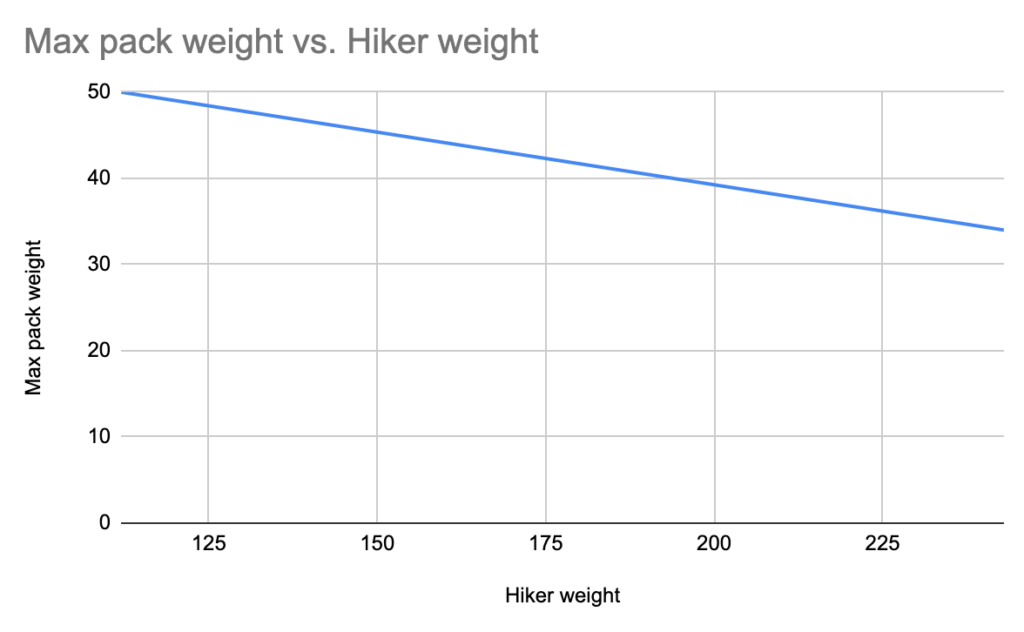Hikers: Find Your Best Backpack Weight
Hikers are often advised that their best backpack weight is a percentage of their body weight, so smaller individuals must carry lighter loads, right? Wrong. The truth is a little more complicated, but worth the effort. Smaller hikers actually carry heavier loads, so there is a more accurate way to figure out the optimal backpack weight for your size, courtesy of Kansas State University physics professor Michael O’Shea.
While leading students on extended (more than seven days) backpacking trips for Outward Bound, O’Shea noticed that some of the smaller students could comfortably carry a greater pack weight than the larger ones of similar fitness levels.


“Overall strength of an individual does not determine how heavy a backpack a person can comfortably carry,” he says. There’s more to it.
Hikers must carry not only their packs, but also their own body weight, so O’Shea developed a way to more accurately estimate the optimal pack weight for a given hiker to carry.
“Online advice from several sources was somewhat misleading in suggesting that pack weight should be a certain percent of a person’s weight,” O’Shea explains. Actually, as the size of any animal increases, strength increases more slowly than body weight. This is the reason why tiny ants can carry a lot more compared to their body weight than can, say, an elephant.
O’Shea used body scaling proportions from other research to create a working model that matched his observations of hikers. The resulting equation takes into account the hiker’s entire load—backpack plus body weight—and can be used to determine the maximum backpack weight for an individual of a given size.
How to find your best backpack weight
Basically, while a hiker’s strength increases with body weight, the hiker’s weight increase itself takes up a larger and larger part of the carrying capacity, decreasing the maximum backpack size for that hiker. With this information in mind, O’Shea calculates that a 112 pound hiker can manage a 50 pound backpack (45% of body weight), but a 243 pound hiker might carry only a 34 pound backpack (14% of body weight).
The chart below gives a simplified visual of O’Shea’s calculations.


Naturally, the model has to make some key assumptions. Namely, that the hikers being compared have similar body-fat percentages, so an increase in size does correspond to a proportional increase in strength. Of course, best pack weight will be higher for hikers who have been training specifically for backpacking and lower for untrained hikers. Nevertheless, this new model provides a more accurate and useful estimation of a hiker’s carrying capacity than a simple percentage of body weight.
RELATED: IMPROVE YOUR RUNNING WITH PHYSICS
O’Shea’s model can help inform hikers’ packing decisions, and it also fits into the classroom as a real-world example of physics in action. “Students should be able to see how some aspects of complex systems, in this case the frame of a human being, can be modeled in a relatively simple way to extract useful information,” he said.
RELATED: Stay Healthy with Low-Volume HIIT
Of course, this hiking backpack weight calculation doesn’t take into account other factors such as an injury, fitness level, or personal preference.
The new model for more accurately estimating an individual backpacker’s best backpack weight is described this week in the journal The Physics Teacher, published by the American Association of Physics Teachers (AAPT).
Reference
Oshea, M. (2014). Backpack Weight and the Scaling of the Human Frame. The Physics Teacher,52(8), 479-481. doi:10.1119/1.4897584




